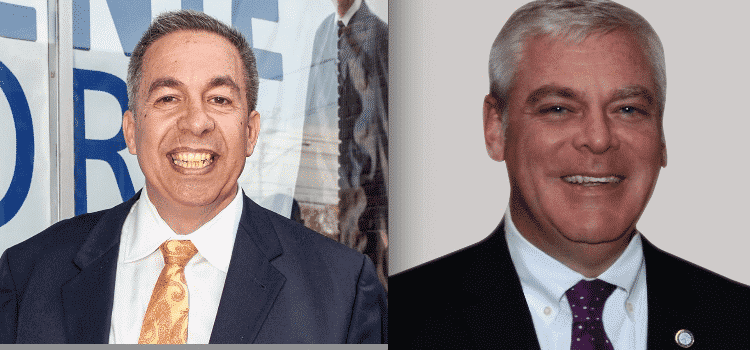
![Democratic challenger Richard Corrente, left, and incumbent Republican Mayor Scott Avedisian. [Photos: Richard Corrente for Mayor of Warwick and Avedisian for Mayor of Warwick Facebook pages]](https://e8dgfhu6pow.exactdn.com/wp-content/uploads/2016/10/Warwick-mayor-candidates-600x350.png?strip=all&lossy=1&ssl=1)
In Avedisian’s case, that meant reminding voters that Warwick is in stable financial shape with a thriving business sector, and that he believes the school department should slow its drive to consolidate elementary schools, following the shaky move to shrink the city’s number of middle and high schools.
For Corrente, however, the opportunity was to correct some of the clearly fallacious claims that he’s made about the city, like his oft-repeated and debunked statement that Warwick has lost some 4,600 businesses over the last decade. 
[Corrente’s website has recently been changed to say 800 businesses have left the city over the last 10 years, but none of the available data reflects anything of the sort.]
When directly challenged on his claims about the business sector during the debate, Corrente dodged the question and said, “If you don’t think people are moving out of Warwick, just look at our schools.”
By talking about the population decline, Corrente clung to his talking point about businesses at all costs, which is doubly insulting to voters, since that wasn’t what Avedisian was challenging, and there’s overwhelming evidence that Corrente’s statement is just not true.
And where Avedisian sought to settle voters’ anxiety by explaining that he is in regular communication with school administrators, Corrente tried to make an issue of Avedisian’s lack of attendance at school board meetings.
How, precisely, this would provide better insight into the department’s day-to-day operations wasn’t made clear by the challenger. [Here’s a hint: It wouldn’t. At best, the school committee gets what the superintendent and his staff can report at any one time — which is exactly what Avedisian is saying he receives for information]
Since this was the lone debate heading into the Nov. 8 vote, the stakes for Avedisian were, comparatively, low. He’s a popular and well-respected incumbent with a history of good management in guiding Rhode Island’s second-largest city for more than a decade and a half without even the hint of financial trouble that has plagued other communities.
For Corrente, the stakes were much higher: He had to try and convince voters, after 20-plus months of his self-funded campaign, that he could actually stand up to scrutiny and earn their trust.
Arguably, Corrente also had a chance to take Avedisian to task for some legitimate issues — like past wrangles with the city council over the budget, the delay in following up on the snow removal ordinance, and the apparent lack of proper training and management that tragically left a child dead at City Park over the summer — that potentially point to some cracks in the mayor’s otherwise solid record of running the city.
But by holding firm to his already-disproven claims, trying to attack Avedisian for believing that manageable tax increases are preferable to fiscal disaster, and repeating pie-in-the-sky gimmicks like tax refunds for new businesses that lack any details on how they’ll be funded, Corrente showed that he’s going to stand by his nearly two-year-old rhetoric, no matter what.
In the end, then, voters will choose between two men who are, essentially, set in their ways.
With Avedisian, that means continued good stewardship of the city and avoidance of major financial problems in the foreseeable future; with Corrente, that means fierce opposition to any facts that dispute his beliefs and insistence that lower revenue is a good thing, no matter the inevitable disastrous result to the city, because he thinks it could get him elected.
Conclusion: Avedisian has all but ensured another victory on Nov. 8 by reminding voters of his successful management of the city, while Corrente is likely to join a long line of challengers who list “defeated by Scott Avedisian” as their political record.
This is a test

